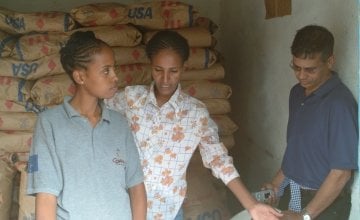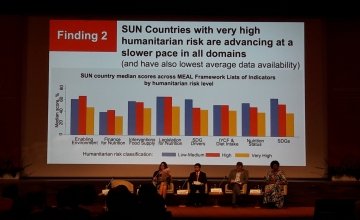
Read our 2024 annual report

Knowledge Hub
Accelerating towards zero hunger with SUN
Concern’s Director of Strategy, Advocacy and Learning, Connell Foley, reflects on the Scaling Up Nutrition (SUN) movement, and his recent experience at SUN’s 2017 Global Gathering.
A real movement?
In early November, I attended the Global Gathering of the Scaling Up Nutrition (SUN) movement in Abidjan, Cote D’Ivoire. I am not a great fan of attending big conferences and certainly the expense involved in the running of major global events always sits uncomfortably with Concern’s culture. However, that sense of hesitation should always be balanced with the importance of getting genuine global momentum and change at all levels on a particular issue.
I really like how SUN sees itself as a ‘movement’, that we are all particles of a moving stream of action and change and that we can only achieve lasting change by working together.
That is essential and with nutrition, I would say that it has been working and of huge value over the last five years or so.
Nutrition as a key ‘marker’ of development
I remember being in Eritrea in 2004 reviewing a programme and our erstwhile Livelihoods Advisor, Catherine Allen, and I were puzzled over malnutrition rates. The Global Acute Malnutrition (GAM) rate was fluctuating frequently between 13% and 18% while the Severe Acute Malnutrition (SAM) stayed reasonably static at 2-3%. This suggested that while there is a level of moderate chronic malnutrition in the whole community, members were not becoming so malnourished that their lives are in danger. We put this down to traditional sharing and safety net systems embedded in communities and/or to the value of milk! In my wider discussions with Janardhan Rao, our Country Director at the time, Janu said that he felt that malnutrition was probably the best overall indicator of poverty in the country. I remember three things he said then and that was one of them. (Like Guy Clarke’s line: “Second best ten dollars I ever spent”, this is designed to pique your interest!).

At the SUN gathering in Abidjan in November, this idea of nutrition being the ‘maker and marker’ of development was repeated. Traditionally, one of the biggest issues with nutrition is that it has been what we sometimes call ‘an institutional orphan’ and its value seems to slip between ministry responsibilities. It has traditionally been part of health – and certainly much of it belongs there since it does relate to the optimal functioning of our physiology – but we also know that good nutrition is closely tied food security and consumer and eating behaviours. The findings of the series of The Lancet journals on maternal and child nutrition outline the key interventions that impact on nutrition and show the importance of ‘nutrition sensitive’ as well as ‘nutrition specific’ activities if we are to address chronic malnutrition (usually referred to as ‘stunting’ or low height for age).
The SUN movement has been brilliant at driving leadership across all key ministries in a country and supporting the development of ‘national costed nutrition plans’ which embed nutritional outcomes across a range of the important governmental departments that have a contribution to make.
My ‘take-aways’ from the Global Gathering
I found the greatest value in the workshops, the side meetings and many conversations on the sidelines of the main plenary sessions. In fairness to the organisers, they built in plenty of time for this and got the balance just right.
The launch of the baseline report of the Monitoring, Evaluation, Accountability and Learning (MEAL, ironically!) system by Patrizia Fracassi was very useful to give people a sense of how the 60 SUN countries are doing and in identifying which particular measures of progress were and were not going well.
Given that Concern is focused on fragile contexts now, it was great to welcome Afghanistan to the movement as the 60th country and to see that Central Africa Republic is also a recent member.
A key finding and one that will surprise no one is that the countries that are affected by crisis and conflict are further behind. This is why Concern believes that a focus on these countries is key to “leaving no on behind”, a mantra of the Sustainable Development Goals.

Sharing learning: a principle?
The first point that struck me is that the sharing of lessons learned and more resonant between countries and organisations who see themselves as similar.
A blind spot on the role of civil society in SUN?
There are four networks in the SUN Movement which represent the key actors working on nutrition. These are the Donor Network, the Business Network, the UN Network and the Civil Society Network. I am on the steering group of the Civil Society Network (CSN) and we are meant to listen to the voices from the civil society alliances in each country and keep the civil society voice alive, amplified and heard across the movement. As a relative newcomer to the steering group, I have observed a blind-spot in how we have been working to-date. It is that most of the work of the CSN and the civil society alliances in each country has been very heavily focused on advocacy, policy, communications and accountability and I have seen very little commentary from civil society about the realities on the ground. We seem to have a gap in relation to literature on the implementation or delivery of services.
This could be because most of the staff of the secretariat and the civil society alliances in-country are advocacy and policy focused and that this is where their experience and skills lie. It could also be linked with the stages in the SUN Theory of Change whereby there is an initial focus on leadership, ownership and cross-ministry buy-in and collaboration. It is also likely that many of the members of the civil society alliances in country are working away on implementation issues but they are not being properly collated and distilled.
We, in Concern, are seen as very grounded and I think that overall this is one of the expectations of civil society – that we are close to people, that we are grounded, that we ‘say it like it is’ and shine a light on the gaps on the ground or at district level.
I shall be working with my excellent and committed colleagues on the CSN to focus more in this direction in the coming years, because I think that this is also where the greatest value of civil society probably lies.
Case studies from Zambia
It was great to see the Zambia country delegation speak about and disseminate case studies and narrative about the progress of the SUN movement in Zambia. The case studies were written up by Concern advocacy staff Olive Towey and Joanna Francis for use at the Global Gathering.
Learn more about Concern
Learn more about the diversity of our work in 26 countries worldwide.
Thought Leadership series
- A solution to extreme poverty? Graduation programmes pave the way
- Urban diasasters: Preventing another tragedy in Freetown
- Four major food crises in 2017: What's going wrong?
- Conflict often breeds disaster. So why is it neglected in Disaster Risk Reduction?
- Innovations for maternal and newborn health: Getting from 'great ideas' to 'global lifesavers'


